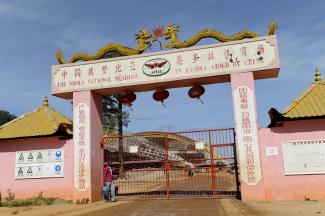South-south cooperation
China’s role in Africa

Since 2000, China has emerged as an important player in Africa. Its “going global” strategy is mainly about making direct investments abroad. These investments usually serve the purpose of safeguarding access to commodities. The China Exim-Bank and China Development Bank are two large public-sector institutions that support Chinese investors in Africa, where some 2,000 Chinese companies are currently active.
In 2011, the People’s Republic of China became Africa’s most important trading partner, ahead of the USA. According to Südwind, around 90 % of Chinese imports from the continent are raw materials. In 2012, oil alone accounted for around 48 %. China’s exports to Africa are almost exclusively manufactured products, however, from cargo ships to air conditioners, communications technology, shoes and plastic goods. Africa’s trade with China thus differs very little from its trade with Europe.
According to the authors, the data on Chinese investments in Africa is unsatisfying. They cite a lack of transparency and state that statistics are complicated, so it is a challenge to distinguish profit-oriented business from real development assistance. According to estimates, Chinese development aid amounts to somewhere between $ 1.5 billion and $ 18 billion. There is no doubt that the sums officially transferred from China to Africa without profit intentions have increased in recent years, the authors state. From 2000 to 2010, some 1,500 projects in 50 African countries were funded with Chinese assistance.
The most important organisation for China’s relations with Africa is the Forum for China-Africa Cooperation (FOCAC), which was founded in 2000. The Südwind experts argue that the purpose of this conference of ministers is to strengthen economic, political and development-oriented cooperation. The guiding principles for the Chinese side are:
- Strategic partnership at eye-level that offer win-win opportunities for both sides: “new” south-south partnerships are not supposed to follow the example of the donor-recipient relations that typically mark north-south cooperation.
- No interference in domestic affairs: China views all countries as entirely sovereign and respects their territorial integrity. It considers its non-interventionist strategy to be the antithesis to the conditionalities that western donors often apply.
- Solidarity among developing countries: China defines itself as a developing country and wants all developing countries to tackle injustices of the international system, including their underrepresentation in multilateral organisations, in a spirit of solidarity.
In these regards China’s Africa policy resembles the approaches of other emerging markets. The Südwind authors point out that this attitude is based on “negative experiences” emerging markets had in their role as aid recipients. At the same time, the authors see China’s increasing engagement in Africa not just as motivated by the People’s Republic economic interests, but also as an attempt to raise its profile in global affairs and gain more influence.
Criticism of China
Western donor governments have repeatedly criticised China’s activities in Africa. To a large extent, the Südwind authors agree. China’s economic interests are to safeguard access to commodities and market manufactured goods, and they are the absolute priorities of its Africa policy. Infrastructure projects that China sponsored serve these goals. New roads built in Mozambique or the Democratic Republic of the Congo, for instance, have improved access to mines. However, the Südwind experts also point out that similar self-interests marked the development policies of western donor nations in the past – and sometimes still do.
Western governments criticise that China cooperates with authoritarian regimes, regardless of human-rights infringements. Such criticism is valid, according to the Südwind team. It adds however: “Western donors would be more credible, if they themselves hadn’t for decades supported regimes that ignored human rights.”
The study states that China’s development concept differs from the western ones in that it puts economic progress and social advancements for the masses before individual rights and liberty. This model has had great success in China (see interview with Ayumi Konishi in D+C/E+Z 2014/12, p. 460 ff.). In this sense, China’s Africa policy thus reflects is own experience.
Civil-society actors in democratic countries, whether from Africa or other continents, view China’s engagement with mixed feelings. According to the Südwind team, the emerging markets tend to see China as a counterweight to the old hegemonic powers and hope that unfair global economic structures will be overcome. At the same time, the emerging markets are copying the unsustainable consumption and production patterns that are prevalent in rich nations. Many non-governmental organisations are upset about the depletion of natural resources, the lack of social security, terrible working conditions and low pay in emerging markets.
The Südwind authors conclude that China’s influence on African development must be considered on a country-by-country basis. In countries under authoritarian regimes, China’s influence is problematic, because it is boosting the autocrats’ power. China’s strategy, moreover, is ultimately geared to keeping Africa stuck in the role of a low-wage continent and commodity supplier.
At the same time, Chinese investments can complement official development assistance from western nations, the authors argue. Infrastructure investments of the kind China is promoting have been shunned by established donors for some time. Ultimately, it depends on African governments what benefits they derive from China’s engagement, the authors conclude: “They must assume responsibility for their countries in order to get the maximum benefits out of China’s engagement.”
Sabine Balk
Link:
Südwind-Institut, 2014: Partnerschaft auf Augenhöhe? Die Rolle Chinas in Afrika (Partnership at eye-level? China’s role in Africa – only in German).
http://www.suedwind-institut.de/fileadmin/fuerSuedwind/Publikationen/2014/2014-22_Partnerschaft_auf_Augenhoehe._Die_Rolle_Chinas_in_Afrika.pdf








